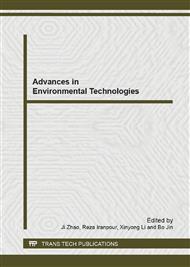[1]
N. Sachs: Planning the funeral at the birth: Extended producer responsibility in the European Union and the United States. Harvard Environmental Law Review Vol.30 (2006), 51-98.
Google Scholar
[2]
M. Savage: Implementation of the waste electric and electronic equipment directive in EU. Institute for Prospective Technological Studies. Available at http://wftp.jrc.es/EURdoc /eur22231en.pdf (accessed date October 24, 2007).
Google Scholar
[3]
TRC, Technology-Recycling. Environment: Why? Available at http://www.technology-recycling. com/pages/environment_why.html (accessed date January 15, 2011).
Google Scholar
[4]
E. Plambeck and Q. Wang: Effects of e-waste regulation on new product introduction. Management Science Vol.55 (2009), 333-347.
DOI: 10.1287/mnsc.1080.0970
Google Scholar
[5]
C. Lawton: The war on returns. Wall Street Journal (2008), May 8, D1.
Google Scholar
[6]
V. D. R. Guide Jr and L. N. Van Wassenhove: The evolution of closed-loop supply chain research. Operations Research Vol.57 (2009), 10-18.
DOI: 10.1287/opre.1080.0628
Google Scholar
[7]
A. Atasu, L. N. Van Wassenhove and M. Sarvary: Efficient take-back legislation. Production and Operations Management Vol.18 (2009), 243–258.
DOI: 10.1111/j.1937-5956.2009.01004.x
Google Scholar
[8]
V. V. Agrawal, L. M. Ferguson, B. Toktay and V. M. Thomas: Is leasing greener than selling? Management Science Vol.58 (2012), pp.523-533.
DOI: 10.1287/mnsc.1110.1428
Google Scholar
[9]
R. Bokusheva, S. C. Kumbhakar and B. Lehmann: The effect of environmental regulations on Swiss farm productivity. International Journal of Production Economics Vol.136 (2011), p.93–101.
DOI: 10.1016/j.ijpe.2011.09.017
Google Scholar
[10]
R. Kleber, S. Zanoni and L. Zavanell: On how buyback and remanufacturing strategies affect the profitability of spare parts supply chains. International Journal of Production Economics Vol.133 (2011), 135–142.
DOI: 10.1016/j.ijpe.2010.04.020
Google Scholar
[11]
A. Atasu, M. Sarvary and L. N. Van Wassenhove: Remanufacturing as a Marketing Strategy. Management Science. Vol.54 (2008), p.1731–1746.
DOI: 10.1287/mnsc.1080.0893
Google Scholar
[12]
J. Quariguasi-Frota-Neto and J. Bloemhof: An analysis of the eco-efficiency of remanufactured personal computers and mobile phones. Production and Operations Management. Vol.21 (2012), p.101–114.
DOI: 10.1111/j.1937-5956.2011.01234.x
Google Scholar
[13]
T. Gutowski, S. Sahni, A. Boustani and S. Graves: Remanufacturing and Energy Savings. Environmental Science & Technology, Vol.45 (2011), pp.4540-4547.
DOI: 10.1021/es102598b
Google Scholar
[14]
R. Subramanian, B. Talbot and S. Gupta: An approach to integrating environmental considerations within managerial decision-making. Journal of Industrial Ecology. Vol.14 (2010), pp.378-398.
DOI: 10.1111/j.1530-9290.2010.00243.x
Google Scholar
[15]
K. Intlekofer: Environmental implications of leasing. Unpublished doctoral dissertation, (2009), Georgia Institute of Technology, Atlanta.
Google Scholar


